On May 27, the world was reeling in horror at the videos from Gaza following Israeli airstrikes on the supposed safe zone in Rafah that killed at least 45 Palestinians, including beheading a child. In downtown Toronto, people protested outside the Israeli consulate. Further north in the city at a synagogue, however, outrage was mostly directed elsewhere, including Toronto Star columnist Shree Paradkar’s tweets.
That night, the synagogue hosted a “keynote address” by Canadaland founder Jesse Brown titled, “The Slow Pogrom: Antisemitism in Canadian Media.” Given my consistent critiques of Canadaland over the past few months, I decided to register for and attend the event.
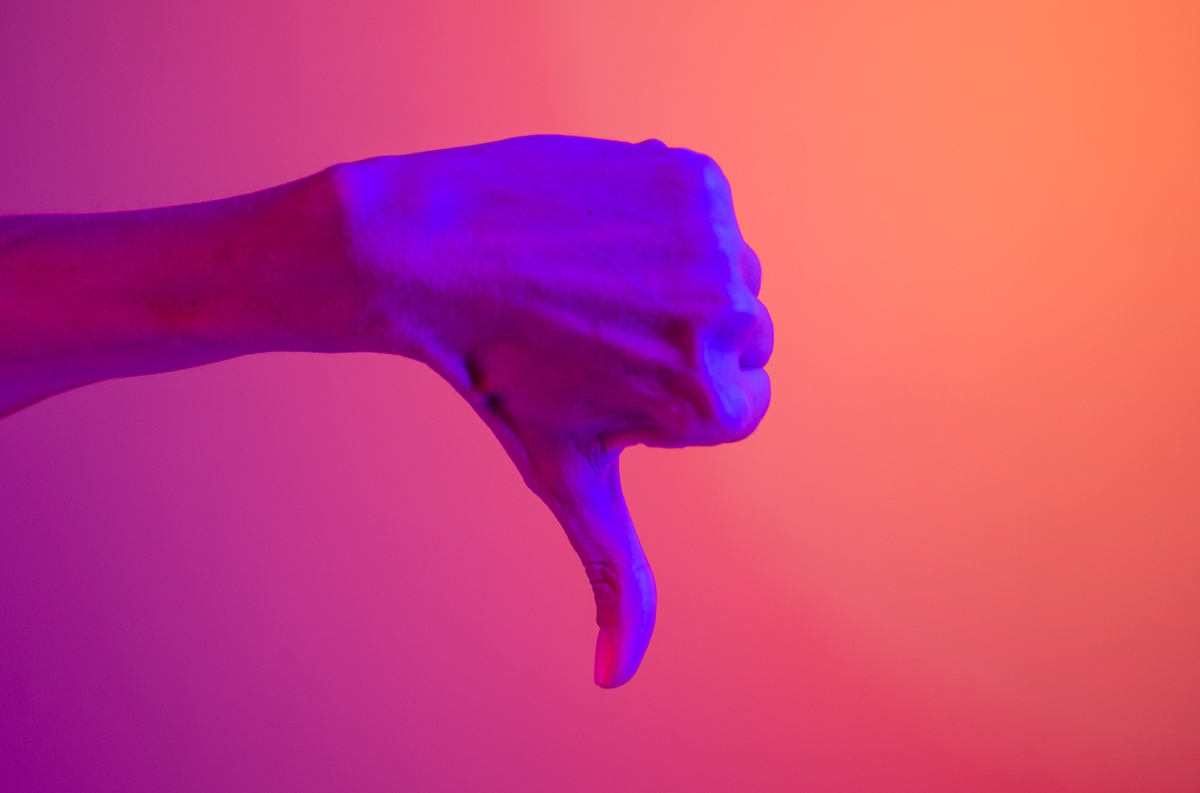
Brown’s talk took an hour, followed by 30 minutes of crowd questions. If you’ve spent any time on Twitter you will have come across Brown’s complaints about Canadian media coverage of alleged antisemitism. This event was more of a greatest hits from his collection than the groundbreaking piece of journalism it was advertised as, with no apparent “considerable original research” on display.
Still, Brown did provide an answer to a question many have asked that I haven’t come across elsewhere, and made some comparisons and suggestions so bizarre that they’re worth documenting.
The State of Canadaland
Brown was the sole person from Canadaland speaking at the event, and perhaps the only one there at all. Still, he didn’t draw a clear distinction for the audience between his online activity and the work Canadaland is doing as a whole. Instead, I got the impression that his efforts have been on behalf of Canadaland, that they represent the direction the publication has gone in and that supporting the outlet will allow him to do more.
Brown introduced Canadaland early in his talk, stating, “For the first 10 years of Canadaland most likely you would find us reporting on Islamophobia when we found it in newspapers, and anti-Indigenous bias in the press.” He said things changed after Oct. 7, 2023, as he started noticing and reporting on “double standards when it came to the ways in which Jews were covered.” Brown depicted this change at Canadaland as more of a shift from one thing to another (i.e., from covering Islamophobia and anti-Indigenous racism to covering antisemitism) rather than merely adding criticism of allegedly antisemitic media coverage to the publication.
At the end of his lecture, Brown gave a plug for Canadaland, saying: “At the risk of reinforcing some stereotypes, journalism is fighting for its life right now. If you learned anything, if this was valuable to you, and if you know something you didn’t know when you came in, please consider supporting Canadaland so that we can do more work like that.” Notice the use of the word “we,” and the positioning of support of Canadaland as enabling more of Brown’s personal work, such as the speech he gave.
Brown admitted to suggesting Canadaland staff alter at least one example of the little bit of work critical of Israel that they’ve done. Brown said he felt an Oct. 19, 2023, Canadaland episode featuring staffer Jonathan Goldsbie and Pacinthe Mattar, had “inaccuracies.” He said, “I raised them, and steps were taken to address them by the editor-in-chief.” The resulting changes to the episode’s page are pretty bizarre.
Commenting on how segments of the public have reacted to Canadaland’s shift, Brown alleged that, “There is a pressure campaign to shut us up.” He claimed that at the most intense moments of this supposed campaign, “detractors of what I had to say were throwing everything they had at us,” including pressuring Canadaland staff to quit. Brown says he was told to stop talking about this — he didn’t specify by whom — because it was bad for business, but that he “stood firm.”
Brown says the efforts from pro-Palestine detractors worked, and the publication started losing supporters. But then, he claims, “it stopped at about 9 per cent,” presumably referring to a percentage of Canadaland members that cancelled their support. Brown described these people and other critics of Canadaland as “a very loud, aggressive and bullying minority.” He added, “And I think that what you have to do with a bully is stand up to them.”
A Slow Pogrom?
The majority of Brown’s speech focused on what event organizers labelled as an ongoing pogrom in Canadian media. Brown didn’t use this exact language, but he did paint a grim picture of the industry.
He claimed, for example, that there are “fewer Jews in newsrooms than ever before,” though he didn’t offer any citation. Brown added, “I know personally of more than a few Jews who have left newsroom positions because they have felt that the environment became toxic. They felt that they were pushed out. They felt that the only principled thing to do was to leave.” As per the broader Jewish community, Brown says that the media has lost its trust, leading to Jews “getting pushed out of public life.”
The reason for this all, Brown claimed, is racism in Canadian media that is putting Jewish people in danger. And he said he could prove it by documenting a record of double standards in how the media reports on Jews. It was interesting to get a clear, concise picture of what Brown believes to be wrong with the media’s reporting on Israel and alleged antisemitism in Canada, but I wasn’t convinced.
Brown focused solely on examples from mainstream Canadian news outlets. Sometimes he breezed through screenshots of incidents, while at others he stopped and discussed them at length, occasionally mentioning names. Here are the journalists I noticed he seemed to spend more time on, with the locations of the work or comments in question linked to: Brishti Basu; Serge Chapleau; Saba Eitizaz; Avi Lewis; Shallima Maharaj; Ginella Massa; Samira Mohyeddin; Shree Paradkar; Omar Sachedina.
Brown’s first major argument was that news outlets aren’t listening to the call of Jewish people to outright label certain things as antisemitic. Instead, he complained, these outlets are turning what he sees as clearly hateful incidents into things whose meanings need to be debated. In other words, he’s effectively complaining that journalists are giving readers more context.
As examples, Brown pointed to articles about the use of the word intifada, the chant, ‘From the river to the sea, Palestine will be free,’ and an incident in Toronto in February where one protester dressed as Spider-Man climbed scaffolding outside Mount Sinai Hospital. Brown said the media not explicitly labelling these things as antisemitic, but rather writing about their contested meanings, is “very frustrating for Jews who feel like they know exactly what they are seeing. The term is gaslit. It can feel like we are being gaslit, constantly.”
Brown is wrong on multiple accounts here.
At a broad level, as Brown knows, only some Jews agree with his categorization of these examples as antisemitic. Why should that segment be granted the privilege of speaking for the whole? Brown also ignores the outlets that have explicitly claimed the examples he cited are antisemitic. More importantly, people usually look at surrounding details to determine whether something is hateful. For example, when discussing the hospital incident, Brown emphasized it would be difficult for it to be a genuine coincidence that Spider-Man “climbed on the awning of the one Jewish building.” However, a detailed piece from David Gray-Donald at The Grind, who was with the rally as it moved throughout downtown Toronto, notes that the hospital scaffolding was in fact just one of at least eight things Spider-Man climbed over the course of a few hours. Gray-Donald’s piece also contradicts many other claims made about the protest.
It’s possible someone could still believe the incident was antisemitic after reading Gray-Donald’s piece, but learning the facts instead of just reading sensationalized headlines elsewhere may make them think differently. And this is important, because what value is there in people believing something hateful has occurred based on incomplete facts? Who does it benefit?
Ironically, Brown said there isn’t much to be gained by the media going to protests to get a sense of how Jewish people feel because only the extreme ends of the community will be represented there. I don’t believe that. Even if it were true, events at protests have proven to be things a much broader segment of the Jewish community reads about and discusses. In fact, these events seem to help them get a sense of the state of antisemitism in Canada. And isn’t there value in them reading about it from someone who was actually there reporting on it?
Another thing Brown listed as a double standard is the media supposedly determining racism based on impact, not intent, when it comes to racialized people and other marginalized groups, but not Jews. I don’t think this is generally true in either case. Coverage of racism in general is less sensitive than Brown seems to believe, and I feel Jewish people often get the benefit of the doubt (when the claims of antisemitism involve pro-Palestine activism) that racialized groups and other religious minorities typically do not. Regardless, the example he chose to make his point was nonsensical and appalling.
Brown compared the November 2023 vandalism outside an Indigo store in downtown Toronto, which consisted of splashing it with red paint and putting up posters, to the Kristallnacht, displaying photos of the two side by side. He went on to claim: “The vandalism at Indigo struck me as just as much of an assault on Jewish safety and just as much of an obvious use of violent symbolism as hanging a noose outside a business where Black people work.”
Other than seeming to genuinely believe this, he made the comparison in order to recall a November 2020 Toronto Star article by former columnist Royson James, with the headline, “Tying a noose isn’t just a symbol of hatred — it’s an act of terror.” He transitioned to the next example by saying, “Here’s what the Toronto Star had to say about the Indigo” case, and then brought up a May 22 column by Toronto Star columnist Shree Paradkar where she claimed “there is no evidence that [Indigo CEO Heather] Reisman was being targeted for being Jewish.” The Toronto Star, he declared, was willing to call the first example racist but contest that the second one was. The horror! It was so appalling to Brown that he followed it up by sarcastically asking, “Is a swastika antisemitic? Can we say that for a fact? I don’t know!”
Of course, both articles he cites are by opinion columnists who … have their own opinions and don’t necessarily represent the Toronto Star’s editorial view. You can’t complain that the Toronto Star did one thing as an institution but not another when talking about the views of two separate opinion columnists.
The circumstances of each case were also drastically different. Brown admitted the intent of the Indigo vandalism was to draw attention to Reisman’s program supporting Israeli soldiers, but claims the impact was different for Jews. But what sort of genuine and noble intent would someone hanging a noose outside a construction site where many Black people work have? These Black workers also surely didn’t create and fund a program to help make it easier for people to join a genocidal army. Truly bizarre stuff.
Brown also put forward some double standards of his own. He ended his talk by complaining about one sentence from a December 4 CTV National News broadcast by host Omar Sachedina. Introducing a segment about a pro-Israel rally, Sachedina stated, “In Ottawa, thousands of Jewish Canadians rallied on Parliament Hill in support of the war, while inside Parliament, Palestinian-Canadians made a plea for help.” Brown was enraged that Sachedina characterized the protest as pro-war, stating, “When he did that, he was saying to anyone who has been watching these ghastly images out of Gaza, ‘Do you want to know who likes this? Do you want to know who is fighting for more of this? It’s these Jews. It’s your neighbours.’” He claimed that Sachedina “put us in danger.”
I watched the segment. The first person interviewed in it is Rabbi Reuben Poupko, the co-chair of the Centre for Israel and Jewish Affairs’ (CIJA) “Canadian Rabbinic Caucus.” Here’s what he said: “Hamas needs to be removed from power. Their ability to harm Israel has to come to an end. Calling for a ceasefire is calling for the state of Israel to be vulnerable and for the Jews of Israel to live in fear.”
I then read some other stories about the rally. Here are some quotes I found:
- “‘I implore our leaders to support Israel in its mission to destroy Hamas.’” - The Canadian Jewish News
- “The crowd booed at the mention of Members of Parliament who have called for a ceasefire.” - Ottawa Citizen
- “If you haven’t already, take a moment to send a resounding message to Prime Minister Trudeau and the Government of Canada. Clarify that the issue is Hamas, not Israel, and express your support for Israelis in their fight against terror.” - Jewish Federation of Ottawa
- “All of them had a similar rallying cry: Canada must stand shoulder-to-shoulder with Israel as it confronts a militant group bent on destroying the Jewish state.” - CBC News
- “Speakers at the rally called for Canadians to speak out for Israel’s right to exist and its need to defend itself against terror.” - City News Ottawa
The prevalence of these sorts of quotes, combined with the outright support of the apartheid state at the rally, countless Israeli flags and what seemed to be just one idea for how to get the hostages back (more war), make Sachedina’s comment seem eminently fair. Not for Brown, though, who appears to believe Sachedina erred by pointing out that at least hundreds of Jewish people went to a pro-war rally co-organized by CIJA, which is unabashedly supportive of Israel’s onslaught.
Brown was comfortable, however, pulling out a couple of times that Hamas flags have appeared in the hundreds of pro-Palestine protests over the course of a few months to help argue that these protests bear responsibility for acts of violence in Canada. He referred multiple times to an incident in January in Edmonton where a man fired shots and lit Molotov cocktails inside the City Hall. Brown admitted the man was “unwell” and that in the video he posted prior to the attack he mentioned many different motivations. Still, Brown concluded he “did it on behalf of Gaza.”
And then later in his talk, drawing a connection between pro-Palestine protests and the Edmonton man’s attack, Brown said, “I think we know from history what these two things have to do with each other. We know what happens when you feed people a steady diet of hatred at a time when people are being filled with moral disgust for what a foreign government is doing.”
Brown is appalled at the accurate labelling of a pro-war rally, and yet is willing to smear pro-Palestine protests to the point of putting culpability for violent actions not committed by them on them.
Brown appears to genuinely believe Jewish people in Canada are facing an existential threat. He claimed, for example, that, “There is an incredible reluctance to tell people that antisemitism in Canada is a fact, and it’s a fact that is happening with an extremity and a frequency that has never happened before.” Later on, he said, “I told you about how the media is doing a disservice in focusing on these [pro-Palestine] protests day in and day out when the biggest story in Canada, from my perspective, is obviously what is happening to [the Jewish] community.”
As a result, I think Brown has misrepresented the state of the industry. Postmedia is the largest newspaper chain in the country, and it’s almost all in on what Brown seems to want from the media. The Maple reported that Postmedia is “publishing articles from a right-wing pro-Israel news site disguised as news wire stories across its chain.” The Breach has run articles with the following headlines: “CTV reports on Gaza with anti-Palestinian double standard, data shows”; “CTV forbids use of ‘Palestine,’ suppresses critical stories about Israel”; “CBC featured more Israelis even as Palestinian casualties rose, data shows”; “CBC says killing of Palestinians doesn’t merit terms ‘murderous,’ ‘brutal’”; “CBC has whitewashed Israel’s crimes in Gaza. I saw it firsthand.”
The Maple and The Breach’s analysis and reporting has examined systemic trends and macro issues. Brown made it appear as though he was doing the same, but in reality, he was just compiling isolated examples. In doing so, he seemed to be either ignoring how much of the media is favourable to what he wants, or calling for all of the media to be that way.
On a personal level, I get the impression Brown feels he has been wronged. Yes, he does think antisemitic double standards exist in the media. But what really seems to bother him is that he feels his publication made an effort to criticize racist double standards, and now that his community is supposedly in the crossfire, the people he defended aren’t there for him. You could argue that this comes from a position of principle, and the sense of solidarity not being extended. I believe he feels he has done groups such as Muslims in Canada a favour through Canadaland’s coverage, and now it’s not being returned. I don’t think it’s a coincidence that some of Brown’s harshest criticism has been reserved for people who have appeared on Canadaland to talk about these sorts of issues.
Brown is a bitter, angry man who seems willing to let Canadaland suffer financially for his own crusade. And if he really believes Jewish people are under the level of threat he says, I don’t blame him for doing what he’s doing. Why would you not use the power in your hands to help stop what you see as a deadly threat to your own community? But I think his assessment of the threat is wrong, his criticism of supposed antisemitic double standards in Canadian media is unfounded and his smearing of the pro-Palestine protests has the impact of hindering their ability to achieve change.
Canada’s complicity in the ongoing genocide should be the biggest story in this country. Brown is on the wrong side of it.


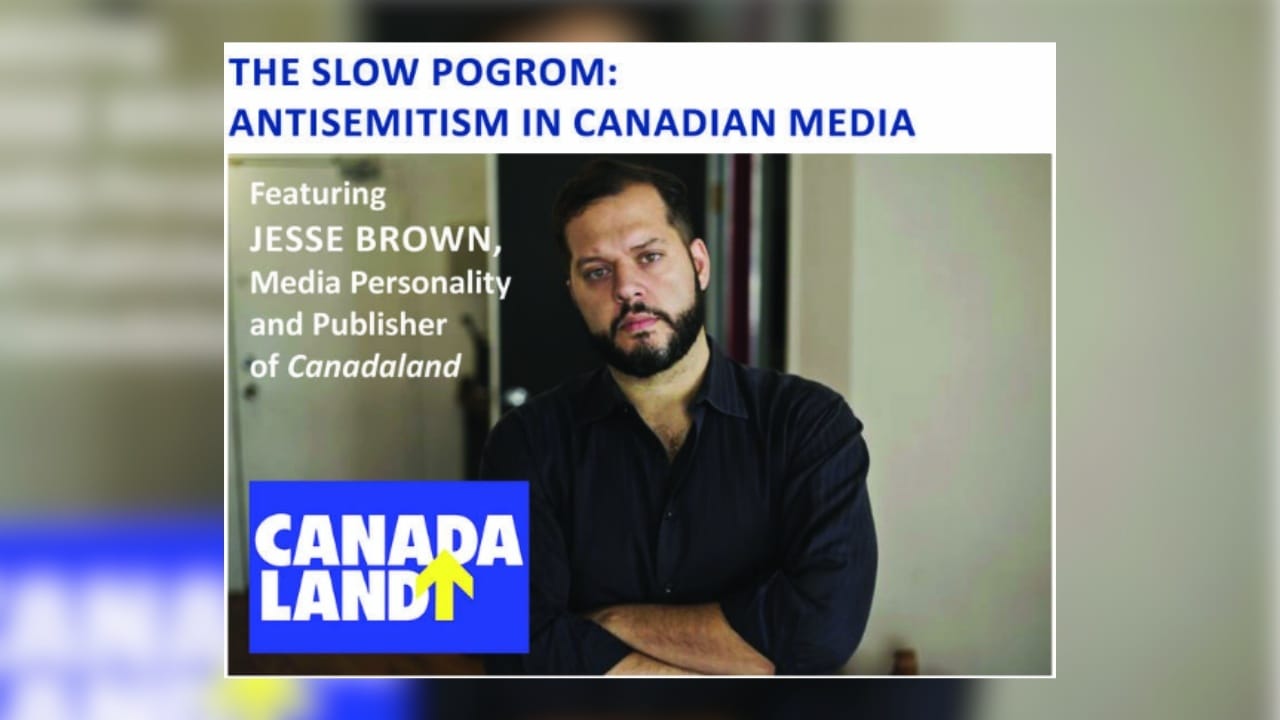

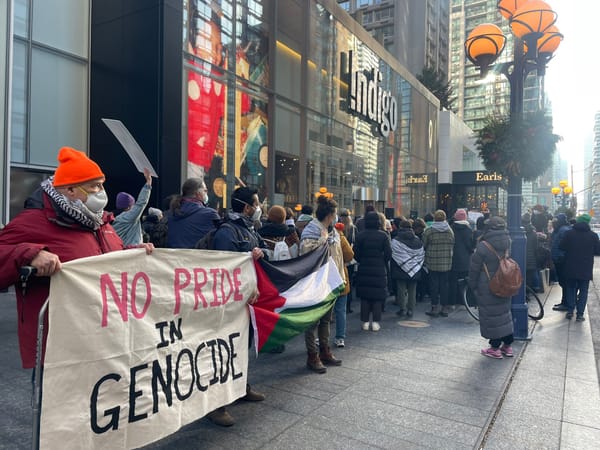
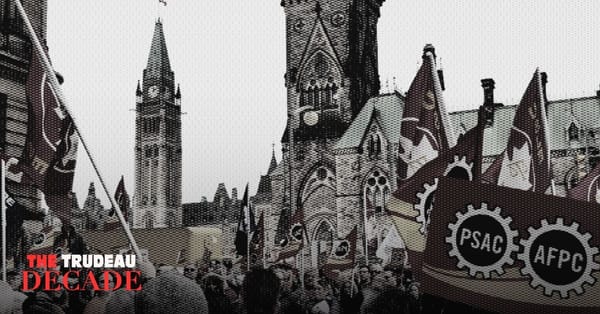

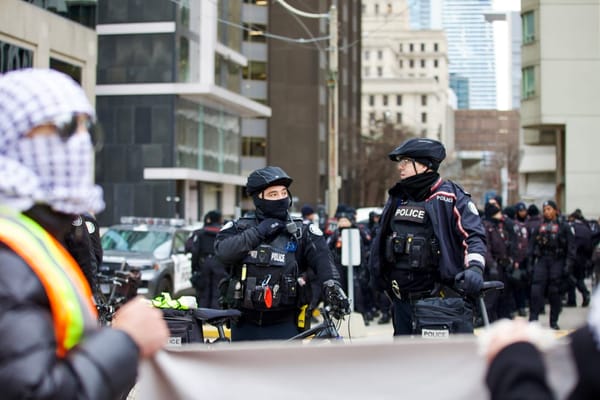

Member discussion